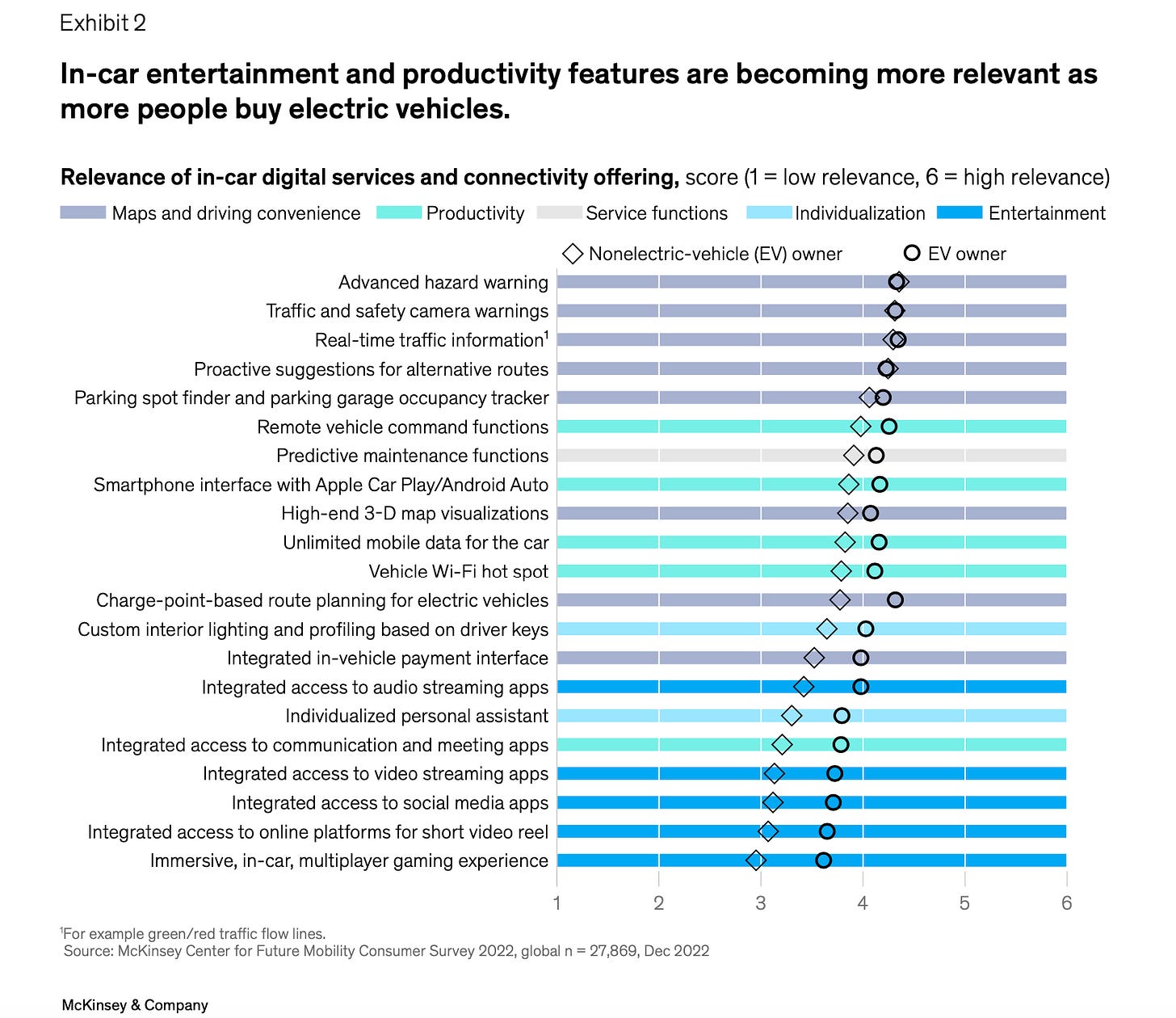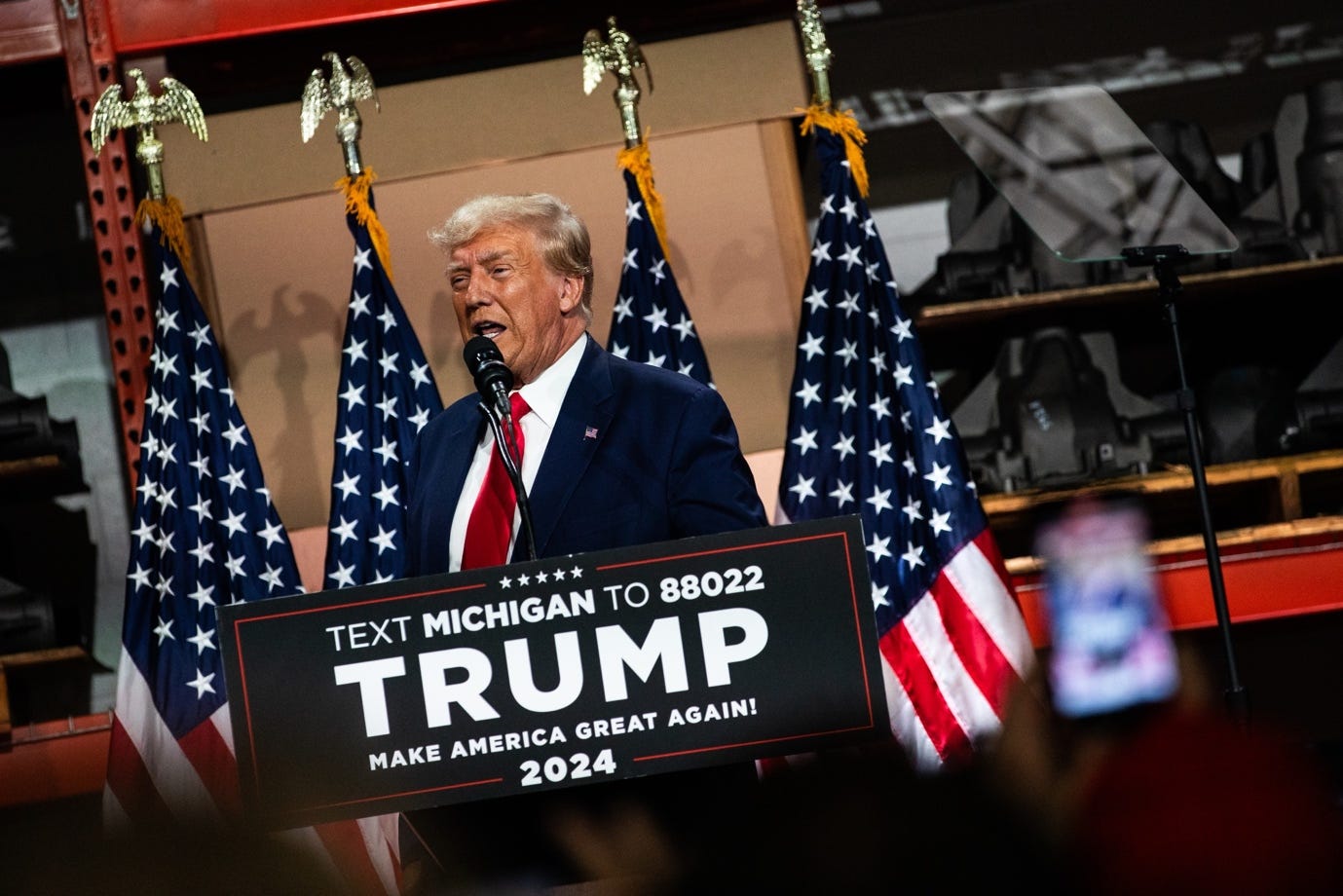Combustion meltdown: a perfect storm spells existential woes for legacy car brands
Politics, structural disadvantage and changing consumer tastes come together to make September a month to forget for US and EU legacy brands
History may look back on September 2023 as the month when the combustion engine faced its extinction event. Strikes and political pressure on the Detroit Big Three are threatening to further weaken their batttle against pureplay EV rivals. Europe is talking tariffs to prevent Chinese manufactured EVs undercutting its manufacturers. And as these political forces hit legacy automakers, the innovation advantages enjoyed by the pureplays become more apparent, from factory automation to the integrated in-car digital experiences buyers are beginning to prioritise over old world engineering.
If you’re new here and arrived via our ‘Windows on net zero culture’ research report, thanks for downloading. If you’re a regular, thanks for sticking with us - we aim to be a crucial digest of the opportunities for creative business and communications as the race to net zero reshapes society and culture. We look across the macro forces - from clean energy and electrification to sustainable manufacture and changing diets - to see where brands can create value and be the change their customers want to see.
Post-hardware cars
On one hand it is ridiculous to refer to cars as anything other than hardware. On the other, recent McKinsey research found that 54% of Chinese car buyers are open to switching their car brand based on the digital experience. The culture in which EV penetration is highest (nudging 40%) is leading the way in demand for personalisation of the experience based on developments in in-car entertainment and work utilities, along with how the vehicle interfaces with its environment through parking, charging, integrated payment and AI assistants.
In its brand story, Xpeng – the Chinese manufacturer Volkswagen recently took a stake in – proclaims the era of car ‘shapes’, ‘features’ and ‘specifications’ is being replaced by one of “new possibilities: putting people over performance”. One where “mobility isn’t just about movement, it’s about human experience.” It’s bold stuff and recognises the old territories of horsepower, fuel consumption, acceleration and top speeds are becoming redundant value propositions in an engineering environment where there’s little room on the spec list for premium hardware features, every car goes like a Porsche and the battle is moving to the interior experience.
This month, premium Chinese EV brand Nio launched its own branded smartphone with over 30 car-specific functions. While this is an acknowledgement of the seamlessness with which the consumer wants the car to integrate with their digital world, it’s also an indicator of the value of gathering data in the coming battle for premium automotive brand loyalty. Swedish brand, Polestar, will also release its own phone in December.
How do consumers perceive in-car connectivity and digital services? - McKinsey
China's Nio to launch first mobile phone in Sept to boost appeal of EV - Reuters
The combustion death rattle
In Detroit, workers for the Big Three auto companies – Ford, GM and Stellantis – striking over demands for a 40% pay increase were joined on the picket line by President Biden, who made a show of support just ahead of Donald Trump’s appearance in Motor City. Both skirted the truth in their pitch to Detroit but it was Trump that really sold a fields-of-daisies-fantasy:
“My pledge to everyone is that a vote for President Trump means the future of the automobile will be made in America. It will be fuelled by American energy, sourced by American suppliers, it will be sculpted from American aluminium and steel, and it will be built by highly skilled American hands and high-wage, American labour.”
As the dispute becomes a key political battleground for the Presidential elections, Elon Musk - whose Tesla workers aren’t unionised - appears to be watching the competition get backed into a corner from which rising costs will further erode the ability to challenge Tesla and other pureplay EV propositions. Even if the Detroit car makers agree to a 25% pay increase, the Big Three would face 40 – 45% higher labour costs than Tesla due to a number of factors, including Tesla’s more advanced levels of automation.
We’ve written before about the ‘capital efficiency’ of EV production from which analysts have projected the likelihood of dramatic price declines in the sector. This will lead first to price parity with combustion vehicles. Then to attractive products in the $20k realm. Add these downward forces on production costs against the rising cost implicit in any deal the legacy brands strike with workers and it’s not hard to pick your horse.
Or as VC Chamath Palihapitiya put it in a recent tweet, “The demand risk for these OEMs is that hyper automated/non unionized competitors like $TSLA can now completely run away with the car market because they will be able to aggressively lower prices.”
Joe Biden makes history by joining UAW picket line - BBC
Elon Musk Says Auto Union’s Demands Would Bankrupt Big Three Carmakers - Bloomberg
Trump says UAW talks don't matter because EV shift will kill jobs
EU looks for an EV life raft
In Europe an anti-subsidy investigation is being launched by Brussels into Chinese EVs ‘distorting’ the EU market, where their imports could be as much as 15% in two years. It’s a sign of nervousness that Germany and France are losing leadership as they fall behind in the green transition.
But despite EU claims that subsidies already allow undercutting by as much as 20%, any action will have to tread a careful line to avoid a trade conflict which could see a retaliation dint the huge export value of sales of European brands in China.
It’s a tough spot because, while the International Energy Agency has just raised its forecast for global EV sales to be 35% of automotive by 2030, the Chinese domestic market has already reached that penetration and rising. Unless EU brands can keep pace with consumer demands in China, where the EV consumer is most evolved, their appeal will dwindle anyway.
To add confusion to this story, the European auto industry is asking the EU to rethink a 10% tariff placed on their exports of EVs to the UK under the post-Brexit Trade and Cooperation Agreement (TCA), not least because of the further opportunity this gives Chinese manufacturers to take share.
Renault chief, Luca de Meo said: “Europe should be supporting its industry in the net zero transition as other regions do, not hindering it.” It’s hard to see how the EU can win here.
EU to launch anti-subsidy probe into Chinese electric vehicles - FT
Germany leads push to delay electric vehicle tariffs between EU and UK - FT
Other Stories
10 years in, LEGO still can’t find the sustainable brick
Lego is desperately trying to find sustainable alternatives to the oil-based plastics used for its iconic bricks, yet after testing hundreds of alternative sustainable materials over the last 10 years (!?) they’re still drawing blanks. Their latest announcement is the failure of PET recycled plastic bottles to deliver the solution at scale. Extra steps needed in the production process use more energy and negate the sustainable benefits. But, they’re not giving up. “We remain fully committed to making Lego bricks from sustainable materials by 2032,” said a spokesperson.
Lego’s Latest Effort to Avoid Oil-Based Plastic Hits Brick Wall – Wall Street Journal
Lego Is a Company Haunted by Its Own Plastic
Sustainable Fashion Week
The first ever Sustainable Fashion Week took place in Brighton last week with the theme ‘The ReWear Revolution’ focused on overcoming the price barrier to a sustainable wardrobe with a focus on reuse, recycling and extending the lifecycle of clothes. “Fashion is now recognised as something you consume that has a serious impact on the environment,” founder Amelia Twine said. “(We want) to make sure people discovering a fabulous second-hand item, or repairing or remodeling one of their existing pieces, enjoy that same rush they get when they buy something new.”
'Repair, re-wear and share' - time to revolutionise fashion for sustainable future – ITV News
UK no longer a world climate leader
Government watchdog, the Climate Change Committee (CCC) says that backing for new oil and coal, airport expansion plans and slow progress on heat pumps means the UK is no longer a leader on climate.
Climate Change Committee says UK no longer a world leader - BBC
About 33_Zero
33_Zero believes the net zero challenge will reshape culture and consumer behaviour with a force brands are unprepared for. The opportunity is to move in step with these changes as they go from the margin to the mainstream.
33_Zero’s sister organisation, Earthtopia, is one of the largest eco-communities on TikTok with a much bigger audience than Greenpeace or Extinction Rebellion and provides a unique window into the consumer change-makers leading the charge.
We offer brands the opportunity to research with the Earthtopia community and draw on our strategic focus on net zero culture to develop creative solutions to the biggest challenges and opportunities that face them today.
Email jamesp@33seconds.co to find out more.









